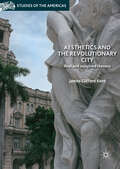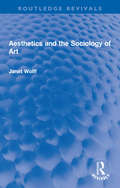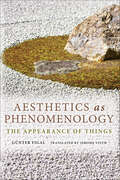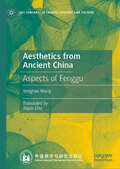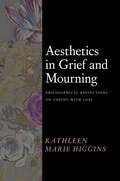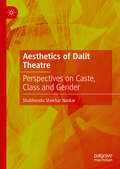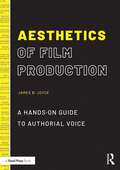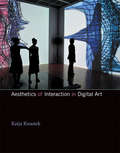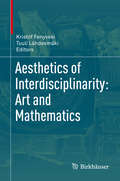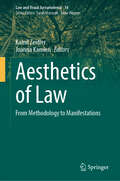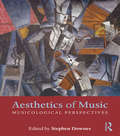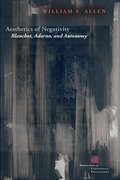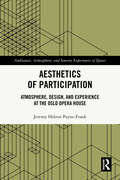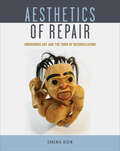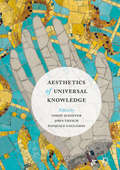- Table View
- List View
Aesthetics and the Revolutionary City: Real and Imagined Havana (Studies of the Americas)
by James Clifford KentAesthetics and the Revolutionary City engages in alternative ways of reading foreign visual representations of Havana through analysis of advertising images, documentary films, and photographic texts. It explores key narratives relating to the projection of different Havana imaginaries and focuses on a range of themes including: pre-revolutionary Cuba; the dream of revolution; and the metaphor of the city “frozen-in-time.” The book also synthesizes contemporary debates regarding the notion of Havana as a real and imagined city space and fleshes out its theoretical insights with a series of stand-alone, important case studies linked to the representation of the Cuban capital in the Western imaginary. The interpretations in the book bring into focus a range of critical historical moments in Cuban history (including the Cuban Revolution and the “Special Period”) and consider the ways in which they have been projected in advertising, documentary film and photography outside the island.
Aesthetics and the Sociology of Art (Routledge Revivals)
by Janet WolffFirst published in 1983, Aesthetics and the Sociology of Art provides a lucid account of two divergent tendencies in the study of aesthetics. At the one extreme, traditional aestheticians have assumed that art and literature are wholly independent, following only the laws and inspirations of artists and artistic movements, and that the question of aesthetic value is accordingly unproblematic. At the other extreme, some sociologists have treated works of art as no more than manifestations of the socio-economic circumstances which produce them, arguing that aesthetic value is therefore entirely relative matter. Janet Wolff shows how both the extreme positions are untenable, and argues convincingly that we must accept that the conceptions and criteria of aesthetic value are socially constructed and inevitably ideological, while stopping short of the reductionist alternative which fails to recognise the irreducible questions of pleasure and of aesthetic discourse. This book provides an invaluably clear guide both to old debates and to otherwise obscure modern controversies, which will be welcomed both by students and scholars in the sociology of art, in aesthetics, in art history, and in literary criticism.
Aesthetics as Phenomenology: The Appearance of Things (Studies in Continental Thought)
by Günter FigalConnecting aesthetic experience with our experience of nature or with other cultural artifacts, Aesthetics as Phenomenology focuses on what art means for cognition, recognition, and affect—how art changes our everyday disposition or behavior. Günter Figal engages in a penetrating analysis of the moment at which, in our contemplation of a work of art, reaction and thought confront each other. For those trained in the visual arts and for more casual viewers, Figal unmasks art as a decentering experience that opens further possibilities for understanding our lives and our world.
Aesthetics at Large: Volume 1: Art, Ethics, Politics (Art, Ethics, Politics)
by Thierry de DuveImmanuel Kant’s Critique of Judgment, Thierry de Duve argues in the first volume of Aesthetics at Large, is as relevant to the appreciation of art today as it was to the enjoyment of beautiful nature in 1790. Going against the grain of all aesthetic theories situated in the Hegelian tradition, this provocative thesis, which already guided de Duve’s groundbreaking book Kant After Duchamp (1996), is here pursued in order to demonstrate that far from confining aesthetics to a stifling formalism isolated from all worldly concerns, Kant’s guidance urgently opens the understanding of art onto ethics and politics. Central to de Duve’s re-reading of the Critique of Judgment is Kant’s idea of sensus communis, ultimately interpreted as the mere yet necessary idea that human beings are capable of living in peace with one another. De Duve pushes Kant’s skepticism to its limits by submitting the idea of sensus communis to various tests leading to questions such as: Do artists speak on behalf of all of us? Is art the transcendental ground of democracy? Or, Was Adorno right when he claimed that no poetry could be written after Auschwitz? Loaded with de Duve’s trademark blend of wit and erudition and written without jargon, these essays radically renew current approaches to some of the most burning issues raised by modern and contemporary art. They are indispensable reading for anyone with a deep interest in art, art history, or philosophical aesthetics.
Aesthetics beyond the Arts: New and Recent Essays
by Arnold BerleantTaking the view that aesthetics is a study grounded in perception, the essays in this volume exhibit many sides of the perceptual complex that is the aesthetic field and develop them in different ways. They reinvigorate our understanding of such arts as music and architecture; they range across the natural landscape to the urban one; they reassess the place of beauty in the modern environment and reassess the significance of the contributions to aesthetic theory of Kant and Dewey; and they broach the kinds of meanings and larger understanding that aesthetic engagement with the human environment can offer. Written over the past decade, these original and innovative essays lead to a fresh encounter with the possibilities of aesthetic experience, one which has constantly evolved, moving in recent years in the direction of what Berleant terms 'social aesthetics', which enhances human-environmental integration and sociality.
Aesthetics from Ancient China: Aspects of Fenggu (Key Concepts in Chinese Thought and Culture)
by Yonghao WangThis book presents the concept of Fenggu, one of the most important aesthetic categories of ancient China. As an inspiring aesthetic principle, it once encapsulated the particularities of various types of artistic creation and played an important role in traditional artistic creation and theoretic critique. The present volume aims to systematically elaborate on its etymological origin, connotations and generation, its great role in overcoming the tendency of creative stereotypes, its logical positioning in the ancient aesthetic system and its profound connection with traditional culture, via comprehensive analysis of a rich repository of original materials, in combination with calligraphy, painting, and poetry criticism. The theoretical character of traditional aesthetics has been derived from agglomeration of Fenggu with other several important categories of paradigm significance. Therefore, its investigation can offer insights into the organic rhythm of the development of ancient aesthetic thought and consequently lay a solid foundation for the construction of ancient art history and aesthetic history.
Aesthetics in Digital Photography
by Henri MaîtreAutomatically evaluating the aesthetic qualities of a photograph is a current challenge for artificial intelligence technologies, yet it is also an opportunity to open up new economic and social possibilities.Aesthetics in Digital Photography presents theories developed over the last 25 centuries by philosophers and art critics, who have sometimes been governed by the objectivity of perception, and other times, of course, by the subjectivity of human judgement. It explores the advances that have been made in neuro-aesthetics and their current limitations.In the field of photography, this book puts aesthetic hypotheses up against experimental verification, and then critically examines attempts to “scientifically” measure this beauty. Special attention is paid to artificial intelligence techniques, taking advantage of machine learning methods and large databases.
Aesthetics in Grief and Mourning: Philosophical Reflections on Coping with Loss
by Kathleen Marie HigginsA philosophical exploration of aesthetic experience during bereavement. In Aesthetics of Grief and Mourning, philosopher Kathleen Marie Higgins reflects on the ways that aesthetics aids people experiencing loss. Some practices related to bereavement, such as funerals, are scripted, but many others are recursive, improvisational, mundane—telling stories, listening to music, and reflecting on art or literature. Higgins shows how these grounding, aesthetic practices can ease the disorienting effects of loss, shedding new light on the importance of aesthetics for personal and communal flourishing.
Aesthetics in Marketing
by Rajat K Baisya G. Ganesh DasA book for Indian designers and brand marketers, Aesthetics in Marketing primarily deals with understanding aesthetics beyond its visual association and making it relevant to product designing strategies. It is the first attempt of its kind to understand the influence of aesthetics in the context of two very important sectors of the industry—consumer durables and automobile. The book analyses various aesthetic attributes, qualities and elements in a product and deliberates on the important of each of these and the kind of balance necessary among them for designing successful products. It stands out on account of the theory, concepts and models discussed, which have a strong foundation in the authors` primary research. Through real-life case studies, interviews, and company and consumer surveys, the authors have brought to the fore the important of aesthetics in various aspects of marketing, like cultivation of a brand image, and have focused on the role played by demographic variables in influencing product buying decisions. Bringing a whole new meaning to the adage `beauty is in the eye of the beholder`, this book will certainly lead to introspection on the importance of `aesthetics` in the market value of a product.
Aesthetics of Absence: Texts on Theatre
by Heiner GoebbelsAesthetics of Absence presents a significant challenge to the many embedded assumptions and hierarchical structures that have become ‘naturalised’ in western theatre production. This is the first English translation of a new collection of writings and lectures by Heiner Goebbels, the renowned German theatre director, composer and teacher. These writings map Goebbels’ engagement with ‘Aesthetics of Absence’ through his own experience at the forefront of innovative music-theatre and performance making. In this volume, Goebbels reflects on works created over a period of more than 20 years staged throughout the world; introduces some of his key artistic influences, including Robert Wilson and Jean-Luc Godard; discusses the work of his students and ex-students, the collective Rimini Protokoll; and sets out the case for a radical rethinking of theatre and performance education. He gives us a rare insight into the rehearsal process of critically acclaimed works such as Eraritjaritjaka and Stifters Dinge, explaining in meticulous detail the way he weaves an eclectic range of references from fine art, theatre, literature, politics, anthropology, contemporary and classical music, jazz and folk, into his multi-textured music-theatre compositions. As an artist who is prepared to share his research and demystify the processes through which his own works come into being, as a teacher with a coherent pedagogical strategy for educating the next generation of theatre-makers, in this volume, Goebbels brings together practice, research and scholarship.
Aesthetics of Dalit Theatre: Perspectives on Caste, Class and Gender
by Shubhendu Shekhar NaskarSince Dalit theatre has not garnered as much recognition as the other genres of Dalit literature have, this book, being one of the pioneering works in the field, aims to highlight the genre within the framework of Dalit literature and the Dalit Movement in India. The discussion extensively delves into the historical background, context and aesthetics of Dalit drama and theatre from epistemological viewpoints. To illustrate the subtleties of caste, class and gender in the pan-Indian scenario, the book includes textual understandings of specific Dalit plays, available in English translation, originally written in Marathi, Tamil, Telugu, and Bengali, covering diverse regions of India. The inclusion of full-length interviews, conducted by the author, of all the living playwrights whose texts have been taken up for analysis, is another substantial facet of this study.
Aesthetics of Excess: The Art and Politics of Black and Latina Embodiment
by Jillian HernandezHeavy makeup, gaudy jewelry, dramatic hairstyles, and clothes that are considered cheap, fake, too short, too tight, or too masculine: working-class Black and Latina girls and women are often framed as embodying "excessive" styles that are presumed to indicate sexual deviance. In Aesthetics of Excess Jillian Hernandez examines how middle-class discourses of aesthetic value racialize the bodies of women and girls of color. At the same time, their style can be a source of cultural capital when appropriated by the contemporary art scene. Drawing on her community arts work with Black and Latina girls in Miami, Hernandez analyzes the art and self-image of these girls alongside works produced by contemporary artists and pop musicians such as Wangechi Mutu, Kara Walker, and Nicki Minaj. Through these relational readings, Hernandez shows how notions of high and low culture are complicated when women and girls of color engage in cultural production and how they challenge the policing of their bodies and sexualities through artistic authorship.
Aesthetics of Film Production: A Hands-On Guide to Authorial Voice
by James B. JoyceExploring aesthetic decision-making skills through active, critical interpretation of the screenplay, this book investigates the ways filmmakers translate a screenplay into a powerful film. Guiding the reader through the formal choices a filmmaker makes, this book encompasses all aspects of the filmmaking process, including directing, acting, cinematography, lighting, production design, sound, and editing. Author Joyce illustrates how to apply aesthetics in a way that encourages creative thinking and stylistic choices, while emphasizing the importance of active decision-making to foreground the screenplay in the filmmaking process. Focusing on how films should be crafted stylistically from beat to beat, the book provides tangible footholds to assist filmmakers with the aesthetic decision-making process, empowering filmmakers to create films to resonate emotionally and intellectually. Ideal for students of filmmaking and aspiring filmmakers looking to train their gut and hone their creative and aesthetic decision-making in the filmmaking process. Additional online screenplay samples show how one singular story can be told with different emphasis and narrative perspectives.
Aesthetics of Interaction in Digital Art
by Katja Kwastek Niamh WardeSince the 1960s, artworks that involve the participation of the spectator have received extensive scholarly attention. Yet interactive artworks using digital media still present a challenge for academic art history. In this book, Katja Kwastek argues that the particular aesthetic experience enabled by these new media works can open up new perspectives for our understanding of art and media alike. Kwastek, herself an art historian, offers a set of theoretical and methodological tools that are suitable for understanding and analyzing not only new media art but also other contemporary art forms. Addressing both the theoretician and the practitioner, Kwastek provides an introduction to the history and the terminology of interactive art, a theory of the aesthetics of interaction, and exemplary case studies of interactive media art. Kwastek lays the historical and theoretical groundwork with discussions of processual strategies of twentieth-century art and theories of aesthetic experience, process aesthetics, play, and performance. She then develops an aesthetics of interaction, discussing such aspects as real space and data space, temporal structures, instrumental and phenomenal perspectives, and the relationship between materiality and interpretability. Finally, she applies her theory to specific works of interactive media art, including narratives in virtual and real space, interactive installations, and performance -- with case studies of works by Olia Lialina, Susanne Berkenheger, Stefan Schemat, Teri Rueb, Lynn Hershman, Agnes Heged's, Tmema, David Rokeby, Sonia Cillari, and Blast Theory.
Aesthetics of Interaction in Digital Art (The\mit Press Ser.)
by Katja KwastekAn art-historical perspective on interactive media art that provides theoretical and methodological tools for understanding and analyzing digital art.Since the 1960s, artworks that involve the participation of the spectator have received extensive scholarly attention. Yet interactive artworks using digital media still present a challenge for academic art history. In this book, Katja Kwastek argues that the particular aesthetic experience enabled by these new media works can open up new perspectives for our understanding of art and media alike. Kwastek, herself an art historian, offers a set of theoretical and methodological tools that are suitable for understanding and analyzing not only new media art but also other contemporary art forms. Addressing both the theoretician and the practitioner, Kwastek provides an introduction to the history and the terminology of interactive art, a theory of the aesthetics of interaction, and exemplary case studies of interactive media art.Kwastek lays the historical and theoretical groundwork and then develops an aesthetics of interaction, discussing such aspects as real space and data space, temporal structures, instrumental and phenomenal perspectives, and the relationship between materiality and interpretability. Finally, she applies her theory to specific works of interactive media art, including narratives in virtual and real space, interactive installations, and performance—with case studies of works by Olia Lialina, Susanne Berkenheger, Stefan Schemat, Teri Rueb, Lynn Hershman, Agnes Hegedüs, Tmema, David Rokeby, Sonia Cillari, and Blast Theory.
Aesthetics of Interdisciplinarity: Art and Mathematics
by Kristóf Fenyvesi Tuuli LähdesmäkiThis anthology fosters an interdisciplinary dialogue between the mathematical and artistic approaches in the field where mathematical and artistic thinking and practice merge. The articles included highlight the most significant current ideas and phenomena, providing a multifaceted and extensive snapshot of the field and indicating how interdisciplinary approaches are applied in the research of various cultural and artistic phenomena. The discussions are related, for example, to the fields of aesthetics, anthropology, art history, art theory, artistic practice, cultural studies, ethno-mathematics, geometry, mathematics, new physics, philosophy, physics, study of visual illusions, and symmetry studies. Further, the book introduces a new concept: the interdisciplinary aesthetics of mathematical art, which the editors use to explain the manifold nature of the aesthetic principles intertwined in these discussions.
Aesthetics of Law: From Methodology to Manifestations (Law and Visual Jurisprudence #14)
by Kamil Zeidler Joanna KamieńThe aesthetics of law deals with the relationship between law and beauty by searching for aesthetic values in the law itself (an internal perspective), by finding material related to law in art and culture (an external perspective), and, lastly, by demonstrating the impact of legal norms on what can be broadly understood as beauty (law as a tool of aestheticization). Regarding all these phenomena, the aesthetics of law ultimately allows us to see the law more clearly and more profoundly. What is more, the law does not function, nor has it ever functioned, separately from its means of expression, which are incontrovertibly subject to aesthetic interpretation. If we think about law in this way, perceiving not only the message, but also the manner in which it is conveyed, the whole set of means and tools used, the perfection and beauty of the form, then we will see art in it. After all, the widely known and still applicable ancient maxim ius est ars boni et aequi equates law and art. This alone should be an argument for aesthetic reflection on the law, a field of endeavour that should never have been abandoned. The book’s twenty-three chapters, written by scholars from various countries and three continents, are thematically diverse. In them we present the manifestations of the aesthetics of law from an external perspective. If we accept a definition of the concept of law that is as broad as possible, not only as a synonym of a certain formalized normative system, but also including the process of its creation (legislation), its application and interpretation (jurisprudence), and even teaching on and research into it (doctrine), we can identify a wealth of aesthetic references in the law. A broadly understood aesthetics of law, approached solely from an external perspective, covers such disciplines as law and literature, the aesthetics of legal rhetoric, the trial as performance, the aesthetics ofcourthouse architecture, law in the fine arts, law in film, law and music, pictorial law, symbols of the law and legal symbols, symbols of the state and power, legal archaeology etc. The field of research is, therefore, wide. In addition to topics traditionally and obviously associated with the aesthetics of law, such as law and literature, law in the fine arts, and court rhetoric, there are chapters on e.g. legal ethics and trademarks. All authors share the belief that beauty in law is important, even when it is hidden in a caricature. Further, they argue for restoring the aesthetics of law to its proper place in philosophical and legal discourse, as doing so would yield a host of benefits for the addressees of law.
Aesthetics of Music: Musicological Perspectives
by Stephen DownesAesthetics of Music: Musicological Approaches is an anthology of fourteen essays, each addressing a single key concept or pair of terms in the aesthetics of music, collectively serving as an authoritative work on musical aesthetics that remains as close to 'the music' as possible. Each essay includes musical examples from works in the 18th, 19th, and into the 20th century. Topics have been selected from amongst widely recognised central issues in musical aesthetics, as well as those that have been somewhat neglected, to create a collection that covers a distinctive range of ideas. All essays cover historical origins, sources, and developments of the chosen idea, survey important musicological approaches, and offer new critical angles or musical case studies in interpretation.
Aesthetics of Negativity: Blanchot, Adorno, and Autonomy (Perspectives in Continental Philosophy)
by William S. AllenMaurice Blanchot and Theodor W. Adorno are among the most difficult but also the most profound thinkers in twentieth-century aesthetics. While their methods and perspectives differ widely, they share a concern with the negativity of the artwork conceived in terms of either its experience and possibility or its critical expression. Such negativity is neither nihilistic nor pessimistic but concerns the status of the artwork and its autonomy in relation to its context or its experience. For both Blanchot and Adorno negativity is the key to understanding the status of the artwork in post-Kantian aesthetics and, although it indicates how art expresses critical possibilities, albeit negatively, it also shows that art bears an irreducible ambiguity such that its meaning can always negate itself. This ambiguity takes on an added material significance when considered in relation to language as the negativity of the work becomes aesthetic in the further sense of being both sensible and experimental, and in doing so the language of the literary work becomes a form of thinking that enables materiality to be thought in its ambiguity.In a series of rich and compelling readings, William S. Allen shows how an original and rigorous mode of thinking arises within Blanchot’s early writings and how Adorno’s aesthetics depends on a relation between language and materiality that has been widely overlooked. Furthermore, by reconsidering the problem of the autonomous work of art in terms of literature, a central issue in modernist aesthetics is given a greater critical and material relevance as a mode of thinking that is abstract and concrete, rigorous and ambiguous. While examples of this kind of writing can be found in the works of Blanchot and Beckett, the demands that such texts place on readers only confirm the challenges and the possibilities that literary autonomy poses to thought.
Aesthetics of Participation: Atmosphere, Design, and Experience at the Oslo Opera House (Ambiances, Atmospheres and Sensory Experiences of Spaces)
by Jeremy Hektor Payne-FrankThis book explores the way people participate with the Oslo Opera House, Norway. As an iconic and culture-led building, these different modes of participation reveal the tensions between staged space and individual experience.Movement, materiality, light, and art are viewed through an atmospheric lens to demonstrate how architecture can shape people’s engagement with, and understanding of, urban space. This book contributes to a growing literatureon atmosphere in relation to our experience of the built environment. In adopting this atmospheric perspective, the book speaks to the concerns of designers, users, and researchers interested in the way contemporary development infuses our cities with the experiential, as a means of developing access, participation, and democracy. It explores the ways in which people experience a building, held up against the claims, intentions, and assumptions that surround it. The book’s focus on design, participation, and experience, in relation to political ideals, will appeal to architects, planners, and academics concerned with the production of space. Equally, its underlying atmospheric contribution and methodological approach will be of interest to designers, scholars, professionals, and students of ambiance, affect and atmosphere, architecture, city planners and urban developers, human geographies, anthropology, and urban studies.
Aesthetics of Pop Music (Theory Redux)
by Diedrich DiederichsenIn this short book, the leading German cultural critic Diedrich Diederichsen puts forward a fresh and original account of pop music. He argues that pop music is not so much a form of music as a constellation of different media channels, social spaces and behavioural systems, of which music is only a part. Its own logic of attraction is based less on compositions and the expression of subjectivity and more on indexicality, real or pseudo-involuntary effects as recorded by sound technologies, and on studio discipline and staging, and hence on performance. By elaborating his innovative account of pop music as a constellation, Diederichsen develops a theory that distinguishes itself from sociology, cultural studies, media studies and ethnography, while at the same time drawing on and encompassing them all.
Aesthetics of Repair: Indigenous Art and the Form of Reconciliation
by Eugenia KisinAesthetics of Repair analyses how the belongings called “art” are mobilized by Indigenous artists and cultural activists in British Columbia, Canada. Drawing on contemporary imaginaries of repair, the book asks how diverse forms of collective reckoning with settler-colonial harm resonate with urgent conversations about aesthetics of care in art. The discussion moves across urban and remote spaces of display for Northwest Coast–style Indigenous art, including galleries and museums, pipeline protests, digital exhibitions, an Indigenous-run art school, and a totem pole repatriation site. The book focuses on the practices around art and artworks as forms of critical Indigenous philosophy, arguing that art’s efficacies in this moment draw on Indigenous protocols for enacting justice between persons, things, and territories. Featuring examples of belongings that embody these social relations – a bentwood box made to house material memories, a totem pole whose return replenishes fish stocks, and a copper broken on the steps of the federal capital – each chapter shows how art is made to matter. Ultimately, Aesthetics of Repair illuminates the collision of contemporary art with extractive economies and contested practices of “resetting” settler-Indigenous relations.
Aesthetics of Sorrow: The Wailing Culture of Yemenite Jewish Women
by Tova GamlielThe term "wailing culture" includes an array of women's behaviors and beliefs following the death of a member of their ethnic group and is typical of Jewish life in Yemeni culture. Central to the practice is wailing itself--a special artistic genre that combines speech with sobbing into moving lyrical poetry that explores the meaning of death and loss. In Aesthetics of Sorrow: The Wailing Culture of Yemenite Jewish Women, Tova Gamliel decodes the cultural and psychological meanings of this practice in an ethnography based on her anthropological research among Yemenite Jewish communities in Israel in 2001-2003. Based on participant-observervation in homes of the bereaved and on twenty-four in-depth interviews with wailing women and men, Gamliel illuminates wailing culture level by level: by the circles in which the activity takes place; the special areas of endeavor that belong to women; and the broad social, historical, and religious context that surrounds these inner circles. She discusses the main themes that define the wailing culture (including the historical origins of women's wailing generally and of Yemenite Jewish wailing in particular), the traits of wailing as an artistic genre, and the wailer as a symbolic type. She also explores the role of wailing in death rituals, as a therapeutic expertise endowed with unique affective mechanisms, as an erotic performance, as a livelihood, and as an indicator of the Jewish exile. In the end, she considers wailing at the intersection of tradition and modernity and examines the study of wailing as a genuine methodological challenge. Gamliel brings a sensitive eye to the vanishing practice of wailing, which has been largely unexamined by scholars and may be unfamiliar to many outside of the Middle East. Her interdisciplinary perspective and her focus on a uniquely female immigrant cultural practice will make this study fascinating reading for scholars of anthropology, gender, folklore, psychology, performance, philosophy, and sociology.
Aesthetics of Universal Knowledge
by Simon Schaffer John Tresch Pasquale GagliardiThis volume presents innovative and provocative arguments about the claims of universal knowledge schemes and the different aesthetic and material forms in which such claims have been made and executed. Contributors take a close look at everything from religious pilgrimages, museums, and maps of the world, to search engines and automated GPS. This collection of essays and debates is the result of a major international dialogue held at the Fondazione Giorgio Cini in Venice, Italy. Current obsessions in information technology, communications theory, and digital culture often concern the value and possibility of a grand accumulation of universally accessible forms of knowledge: total libraries, open data bases, ubiquitous computing, and 'smart' technologies. These obsessions have important social and philosophical origins, and they raise profound questions about the very nature of knowledge and its organization. This volume's contributors draw on the histories of maps and of encyclopedias, worldviews and visionary collections, to make sense of the crucial relation between the way the world is known and how it might be displayed and transformed.
Aesthetics of the Margins / The Margins of Aesthetics: Wild Art Explained
by David Carrier Joachim Pissarro"Wild Art" refers to work that exists outside the established, rarified world of art galleries and cultural channels. It encompasses uncatalogued, uncommodified art not often recognized as such, from graffiti to performance, self-adornment, and beyond. Picking up from their breakthrough book on the subject, Wild Art, David Carrier and Joachim Pissarro here delve into the ideas driving these forms of art, inquire how it came to be marginalized, and advocate for a definition of "taste," one in which each expression is acknowledged as being different while deserving equal merit.Arguing that both the "art world" and "wild art" have the same capacity to produce aesthetic joy, Carrier and Pissarro contend that watching skateboarders perform Christ Air, for example, produces the same sublime experience in one audience that another enjoys while taking in a ballet; therefore, both mediums deserve careful reconsideration. In making their case, the two provide a history of the institutionalization of "taste" in Western thought, point to missed opportunities for its democratization in the past, and demonstrate how the recognition and acceptance of "wild art" in the present will radically transform our understanding of contemporary visual art in the future.Provocative and optimistic, Aesthetics of the Margins / The Margins of Aesthetics rejects the concept of "kitsch" and the high/low art binary, ultimately challenging the art world to become a larger and more inclusive place.
